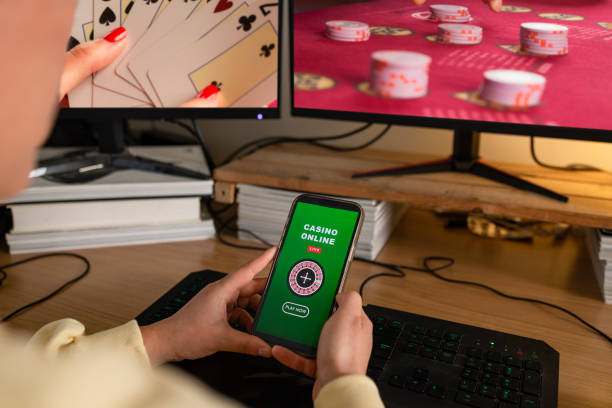Online casinos have become an increasingly popular form of entertainment in Australia, offering players a convenient and secure way to gamble from the comfort of their own homes. However, with the increasing popularity of these sites, there have been some concerns about the potential for hackers to gain access to sensitive information or financial accounts. This article will explore whether phishing ever occurs at digital casinos and what security measures are in place to prevent it.
What Is Phishing on Gambling Platforms?
Phishing a casino website is a type of cybercrime that involves using malicious software and programming in order to gain entry to protected data or system functions. This can involve anything from obtaining player information or logging into a page to stealing funds or manipulating the results of a game. Many casinos have implemented advanced security measures to protect themselves from such assaults, but hackers still pose a threat.
There it is essential for both players who like to play the best Aussie online pokies and operators alike to take precautions during online gambling. Players should be aware of phishing scams, weak passwords, malware, and other types of threats that could compromise their accounts.
Operators must ensure that they have robust security protocols in place and stay up-to-date with the latest advancements in cyber security. Phishing at casinos is a serious problem, and it is important for both players and operators to work together to ensure that their systems remain safe from malicious strikes. By taking the necessary steps to protect their accounts, players can help keep hackers at bay and rest easy when playing at an online casino without being hacked.
Hacking at Online Clubs
Online platforms are a great way to enjoy gaming without ever leaving the comfort of your home. But with the convenience of online gambling comes some risk, as hackers and malicious software can sometimes be present in an online casino.
Phishing doesn’t happen often on online platforms, but it’s important for players to practice good safety habits and keep their personal data safe. Players should only create accounts with reputable digital platforms that have secure encryption technology in place, and they should avoid using public Wi-Fi connections when playing online. They should also be wary of suspicious emails or pop-ups containing malicious links.
When it comes to financial transactions during online gambling, players should always ensure that their bank information is kept safe. Many casinos offer encryption and security services to keep players’ information safe, but it’s still important to always check the site for legitimacy before entering any personal or banking information.
Players can also protect themselves by limiting the amount of money they have in their account at any one time. Having too much money in an online casino account makes it more vulnerable to hackers, so it’s best to withdraw most of your winnings as soon as possible and only keep a small portion on your page at any given time.
How Do Hackers Try to Entry Online Casinos?
Phishers try to reach gambling platforms in various ways, exploiting vulnerabilities in the casino’s software or hardware. Many phishers use malicious code and malware to gain entry to confidential information such as passwords, credit card numbers, and bank pages. Additionally, they may also attempt to manipulate casino gamestop to make money or cause disruption.
Numerous hackers may also take advantage of human error and social engineering tactics such as phishing emails or text messages that are designed to trick users into revealing personal information. Finally, malicious actors might exploit weaknesses in encryption protocols or breach web servers in order to get their hands on sensitive data. No matter which method they choose, phishers often have the same goal: stealing funds from unsuspecting players and disrupting the overall gaming experience. Therefore, it is essential for online casino operators to take proactive steps to protect their customers from cyber-attacks.
Types of Phishing
There are some types of phishing at digital casinos:
- Malware Strike: Malware is malicious software that can be used to gain entry to sensitive information stored on a computer system. Phishers use malware infections to hijack user data in order to steal money or manipulate game results.
- Phishing Scams: Phishing scams involve using deceptive emails or sites designed to look like legitimate brands in order to trick users into entering personal and financial information such as credit card numbers or passwords. This type of scam has become increasingly common at digital casinos, making it important for players to be aware of suspicious emails or websites.
- Denial-of-service (DoS) Strikes: DoS strikes are designed to make computer systems unavailable by flooding them with too many requests, thereby preventing legitimate users from accessing the system. Phishers often use these strikes to take down digital platforms, potentially causing players to lose money in the process.
- Casino Software/Game Exploitation – Attackers may exploit software or game flaws in order to gain an unfair advantage over other players. For example, they might identify a flaw that allows them to manipulate game results or change the odds of winning in their favour.
- Server Breaches and Data Thefts – Servers are vulnerable to data theft, which can lead to the loss of sensitive information such as page details, passwords and financial data. Attackers may also use this type of strike to gain entry to the casino’s software or game code, making it possible for them to manipulate results or take control of an entire gaming system.
What Are the Security Measures Taken by Online Casinos to Prevent Phishing?
Digital platforms take a number of precautions and measures to ensure that all customer data, financial data, and gaming activity are kept secure. They use advanced encryption technologies such as SSL (Secure Socket Layer) to protect player data while in transit between the casino’s servers and the players’ computers. Advanced firewall technologies are also used to block unauthorized entry to the casino’s server. Furthermore, casinos often employ strict safety protocols such as Multi-Factor Authentication (MFA), which requires users to provide two or more authentication factors before being granted entry.
Other safety measures include regular monitoring of database activity for suspicious behaviour and logging activities of all pages on the system. Additionally, many casinos will offer their own proprietary anti-phishing security measures to provide an extra layer of protection. These may include biometric identification systems, unique passwords, and other forms of authentication.
In order to ensure the safety of their players and their investments, digital casinos must regularly update their safety protocols in order to stay ahead of today’s sophisticated phishers. By doing so, they can help protect customers from potential malicious attacks as well as any fraudulent activity that may occur on their sites. Furthermore, it is important for all players to take responsibility for their own safety by always using strong passwords, monitoring activities regularly and never sharing personal information with anyone else online. Taking these simple steps can help protect you against potential hacks when playing at an online casino.
Conclusion
Yes, hacking does occur at gambling clubs. There have been numerous instances of hackers infiltrating gambling sites and using malicious software to steal player information, as well as manipulating the games to gain an unfair advantage. It is important for online casino players to be aware of these risks in order to protect themselves. Online platforms should also take steps to ensure that they are implementing strong safety measures and taking proactive steps to mitigate any potential phishing attempts. By doing so, they can reduce the chances of a successful hack occurring on their site and provide their players with a safe and secure gaming environment.
Published by HOLR Magazine.


